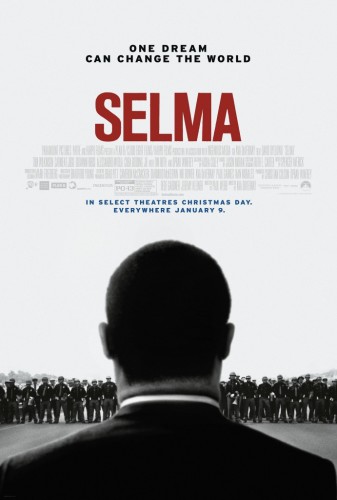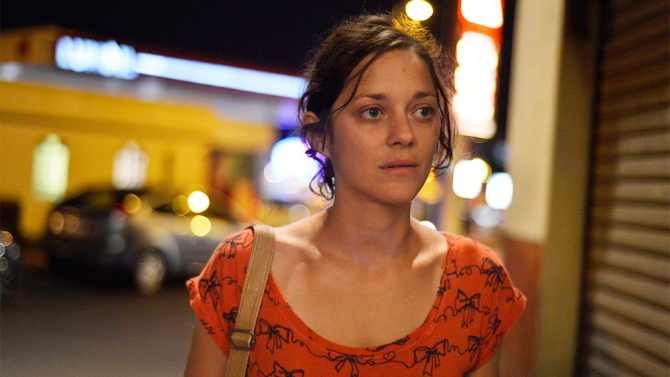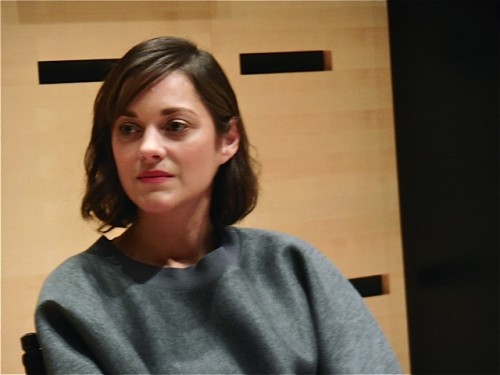Nightcrawler: Centering the White Fear Narrative by Lisa Bolekaja
Bloom is a lonely man who scrapes by on the underbelly of society. His white male privilege allows him to steal, beat up people, and sabotage competitors without fear of repercussions from the police. As the renowned comedian Paul Mooney would say, Bloom has “the complexion for the protection.”
Female Purity Is Some Bullshit: My Problem With Ida by Ren Jender
Religious devotion is a tricky quality to depict in any medium: so many of us have seen piety as hypocrisy both in film and in life that we’re prepared to laugh at or to dismiss deeply held religious beliefs onscreen. In work made for mostly secular audiences, filmmakers who want to show deeply religious characters have to answer the question: if piety isn’t a joke, what exactly is it?
Finding Vivian Maier: The Greatest Art Mystery of the 20th Century by Rachel Redfern
However, Vivian Maier–besides being an obvious genius–remains a mystery. Finding Vivian Maier follows the narrative mystery as we pursue the reclusive and eccentric Vivian (or her personas of Ms. Meier, Mayer, Meyer, Meyers, Maier) across the US and through the streets of the 1950s and 1960s, attempting to discover more of a woman who is still unknowable.
Sexism in Disney’s Into The Woods by Jackson Adler
It seems Disney is saying that The Baker’s Wife is a “fallen woman,” and that it is making a firm decision on how it wants the audience to interpret the affair that occurred. This is made more problematic by how the affair was shot and choreographed. In the film, Cinderella’s Prince pins The Baker’s Wife against a tree and kisses her. There is nowhere for her to escape, even if she wanted to.
A Wild Woman Alone by Ren Jender
The filmmakers (director Jean-Marc Vallée and screenwriter Nick Hornby) profess to be fans of Strayed’s work, but they were apparently so busy patting themselves on the back for not making this story of a woman alone into some kind of boy-meets-girl rom-com that they forgot to include everything else that makes the book distinctive.
Does Hating Foxcatcher Mean I Hate Men? by Robin Hitchcock
Foxcatcher is very serious meditation on men and masculinities, male relationships, and the white male experience of the class system in America. And I am so fucking bored with those subjects, even when they aren’t presented with a deliberately slow pace, sterile tone, and distracting amounts of face putty.
Gone Girl: How to Create the Perfect Female Villain by Alize Emme
Kudos to the 20th Century Fox exec who decided to market Gone Girl (2014) as a great date movie. This is not a date movie. This is a horror story about the sensationalized pitfalls of a doomed marriage.
American Sniper: We Can Kill It for You Wholesale by Lisa Bolekaja
This cowboy motif is no accident, as it connects this film to the old John Ford Westerns and the nostalgia some folks feel about John Wayne flicks and the mythology of good white cowboys fighting off savage Indians who were keeping good white settlers from utilizing this “wilderness” that would become the U.S.A. Dehumanizing non-whites is the foundation for creating this nation. It’s the glue that holds apple pies and hot dogs together.
The Alchemy of Still Alice by Lisa Rosman
What works beyond a shadow of a doubt is Moore herself. For a long time now, she has demonstrated an uncanny range and power without ever subjecting us to a shred of vanity. Here, she outdoes herself, channeling Alice’s physical, mental, and emotional devolution with an alchemy that is as thrilling as it is harrowing. Her luminous features slacken, her cadences falter, her life force fades. Scenes with Stewart are especially heartbreaking.
Gone Girl: Scathing Gender Commentary While Reinforcing Rape and Domestic Violence Myths by Megan Kearns
I wish I could say that Gone Girl is a subversive feminist film exposing myriad gender biases and generating a much-needed dialogue on rape and domestic violence. Yet it reinforces dangerous myths rather than shattering them.
Big Hero 6: Woman Up by Andé Morgan
The female team members are often shown as being more capable then the males, both as combatants and as scientists. Gogo Tomago, and Honey Lemon, are two bright, young scientists who exhibit strength of mind, body, and will. During a training montage, Gogo uses the phrase “woman up” to encourage one of her teammates to do better. This was a great, subversive line because it flowed naturally from the character and the context, rather than seeming like a forced injection of faux-feminism.
Child-Eating Parents in Into the Woods and Every Children’s Story Ever by Katherine Murray
Your dad is an ogre or giant, your mom is a witch, and both of them want to kill you. Welcome to your fairy tale life.
Birdman Is Black Swan for Boys by Robin Hitchcock
Birdman bears striking similarities to Black Swan, both in the broad strokes—each follow their protagonist’s slipping grip on sanity in the days before a high pressure stage debut—and in a strange number of superficial details—hallucinations of menacing black winged creatures, “surprise” lesbian scenes, and ambiguous suicides at least partially showcased on stage.
Am I The Only Person Incredibly Bored With This Awards Season? by Robin Hitchcock
Only one of the Best Actress nominations is from one of the Best Picture nominees, whereas four of the five Best Actor nominations are for Best Picture-nominated films. As I wrote in 2013, this trend suggests that movies with significant roles for women aren’t considered as great or important by the Academy. This year, it is even worse: four of the five Best Actresses were in movies not nominated outside of the acting categories.
What We Talk About When We Talk About Suck by Katherine Murray
So, you just saw a terrible movie and you want to tell the world about it – not so fast. How we frame our discussions about sucky movies depends on who’s listening, and whether we’ve got common ground.
Selma Backlash: Is It a Gender Issue? by Lauren Byrd
So what can women do about these smear campaigns directed at films by women? Go see films directed by women, support these filmmakers any way you can, whether it’s by filling theaters or participating in social media campaigns. We may not be able to change Academy voters’ minds, but we can continue drawing attention to gender disparities and focus on the positive changes.
Doing The Extraordinary in Two Days, One Night by Ren Jender
Women in films are even less likely to engage in this kind of dispirited struggle. Instead an actress usually plays the wife, mother, or girlfriend whose job it is to be “strong” and rub the hero’s back while he battles against his own obstacles. She talks reassuringly to him whenever he doubts himself, the exact same way Sandra’s husband does with her here.
What’s Missing from the Gone Girl Debate? Privilege! by Natalie Wilson
Gone Girl has been called misogynist, an amalgamation of negative stereotypes of women, a text that perpetuates rape culture, and a narrative that fuels Men’s Rights Acivtists’ ugly depiction of the gender equality feminists are trying to achieve. Yet, what is missing from the discussion is a focus on privilege.
Two Days, One Night: Marion Cotillard’s Insight From the New York Film Festival by Paula Schwartz
Cotillard did triple duty at the New York Film Festival Sunday to promote Two Days, One Night, which had its U.S. premiere. (The film is Belgium’s submission for best foreign film.) At 1, in jeans and a casual but chic top, Cotillard participated in a Q&A for a standing-room crowd. At 3 she changed into Dior and walked across the street to Alice Tully Hall and joined the Dardenne Brothers as they introduced ‘Two Days, One Night’ to a sold out audience, and afterward participated in a Q&A.
Where Is the Female Version of Whiplash? by Katherine Murray
I’d really like to see more introspective films about the human experience where the humans experiencing things look like me.
Boyhood (Feat. Girlhood) by Robin Hitchcock
Let’s face it, Boyhood is a gimmick movie. Richard Linklater sporadically filmed it over a twelve-year period so we could see the child actors in it actually grow-up. If you loved Michael Apted’s Up series but wanted more fiction and less wait, Boyhood is for you. But if you just love coming-of-age dramas, I’m not sure I can recommend this one.
Selma Is Now by Nijla Mu’min
In so many ways, this film reflects the current moment, while also highlighting how things have and have not changed since the King family and their allies risked their lives to secure rights for all. Scenes in the film will jolt you into the present: watching Jimmie Lee Jackson’s mother grieve in 1965 for the son she will never see again made me immediately think of the family of Tamir Rice, the young black boy who was murdered by police officers this year for toting a toy gun in Ohio. ‘Selma’ is now.
The Theory of Everything: A “Great Man” From The First Wife’s Point of View by Ren Jender
Do great women exist? The film industry still hasn’t decided. We had Frida a dozen years ago and that bio-pic about Margaret Thatcher (like Frida, directed by a woman) from a few years back–which won Meryl Streep an Oscar, but tepid reviews along with a completely irredeemable main character kept me from seeing it. Usually the women in the “great man” films are great only by osmosis, because they married or otherwise provide emotional–and other–support to great men. The actresses who play these roles win Oscars too: they make the “supporting” category a literal one. The Theory of Everything, the new bio-pic about astrophysicist (and best-selling author) Stephen Hawking seemed like it might be different since it’s based on the book written by the great man’s first wife, Jane.
Selma Shows Why We Need More Black Women Filmmakers by Janell Hobson
DuVernay has said in interviews that when she inherited Paul Webb’s screenplay, she altered it to decenter its focus on President Lyndon B. Johnson (even though the controversy surrounding the film managed to once again re-center the story on white male power and its portrayal). Rather than criticize the director for shifting her gaze away from whiteness (or for getting certain historical details wrong), it may be more useful to consider the difference a woman behind the camera—and a Black woman in particular—brings to a motion picture.
The Imitation Game and Citizenfour: Secrets Then and Now by Ren Jender
Sometimes I wish the mainstream film industry would stop making movies about queers. The rare times that a queer person is allowed to be the main character in one of its movies, as in this one, he (almost always a “he”), like the rare main character of color is usually unrealistically isolated from the community he comes from, a trope fostered from before Stonewall to the ’90s to now: we are oh-so-tragic and oh-so-alone.
Richard Linklater and Ethan Hawke Praise Patricia Arquette’s Performance in Boyhood by Paula Schwartz
Arquette, who is terrific as Olivia, turns in a nuanced and complex performance that is vanity free. We watch her age perceptively and slowly as her character gains wisdom but still falters. In other words, she’s the kind of three-dimensional woman we rarely see in American films.
Captain Uhura Snub: The Politics of Ava DuVernay’s Oscar by Brigit McCone
It is appropriate, when celebrating the legacy of Martin Luther King Jr., to recall Dr. King’s words to Nichelle Nichols, as she considered quitting Star Trek in frustration at the limitations of her role: “You can’t leave!… For the first time on television, we are being seen as we should be seen every day. As intelligent, quality, beautiful people … who can go into space.” Dr. King’s words show that he clearly understood the value of a token image, as a symbol, a precedent and a possibility model for future progress.
The Boxtrolls: Better Than Its “Man in a Dress” Jokes by Ren Jender
In a nice contrast to many children’s films and books, the character at the start who goes against the mob is a girl, Lord Portley-Rind’s daughter, Winnie (voiced by Elle Fanning in a mid-Atlantic accent passing as British). Although Winnie, in her pink ruffled dress and blonde ringlets might look like other storybook heroines, her fits over never being believed or taken seriously by adults and her morbid fascination with the boxtrolls make her more like Daria than Alice in Wonderland. When she asks another character if boxtrolls ate his parents, she adds, “Did they let you, I mean, make you, watch?”
Colleen Attwood’s Costumes in Disney’s Into The Woods by Jackson Adler
Attwood’s designs are stunning, but they also highlight the discussions of gender roles and racial relationships in America.
The Academy’s White Noise: Silencing the Lions by Leigh Kolb
I said that I had hoped this year would be different. However, when the Academy announced its nominations, I was not surprised.
The Grand Budapest Hotel and Wes Anderson Fatigue by Robin Hitchcock
And the worst of it is that awards recognition will probably just send Wes Anderson further up his own ass, if such a thing is even possible. I don’t think I’ll be rushing to see his subsequent films until I hear that he’s finally tried something different.
The Internal Monologue of Wild: Lone Woman Walking, Lone Woman Writing by Elizabeth Kiy
In a film, as in real life, with no language to defend herself, the lone woman is a suspect. She gets stared at and scowled at and catcalled and often told that she’s making herself vulnerable, or taking unnecessary risks. In short, our culture says she’s asking for what she gets. A woman alone is unloved, uncared for and written off. In Wild, the film based on Strayed’s memoir of her months solo hiking the Pacific Crest Trail, she has several uncomfortable and frankly terrifying encounters.
Feminist Highlights and Fails at the 2015 Oscars by Megan Kearns
This year’s Oscars lacked racial diversity with all 20 acting nominees being white. The overwhelming whiteness of the Oscars, which hasn’t been this egregious in nominating people of color since 1998, spurred a Twitter boycott and the hashtag #OscarsSoWhite created by April Reign. In addition to racial diversity, once again the Oscars lacked gender diversity. No women were nominated for director, screenplay (adapted or original), original score or cinematography. The snub of Ava DuVernay especially stung.
Moments of Sincerity in Otherwise Endless Oscars by Josh Ralske
What stood out were what seemed like genuine heartfelt moments. John Legend and Common delivered a spirited performance of “Glory” from snubbed director Ava DuVernay’s Selma, and an equally impassioned acceptance speech when they won, notable for its intersectionality. They brought up Hong Kong’s fight for democracy, Charlie Hebdo, and America’s shameful prison-industrial complex. “Selma is now” is a message many need to hear, including their liberal Hollywood audience.











